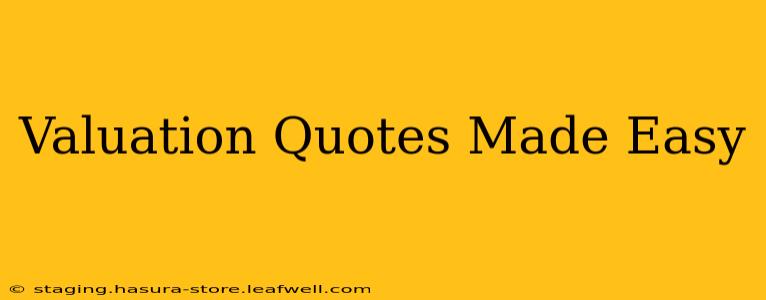Obtaining accurate valuation quotes can feel like navigating a minefield, especially for those unfamiliar with the intricacies of appraisal processes. Whether you're buying, selling, or simply need to understand the worth of an asset, this guide breaks down the process, answering common questions and providing you with the tools to navigate the world of valuation with confidence.
What is a Valuation Quote?
A valuation quote provides an estimated worth of an asset, be it a property, business, artwork, or collectible. It's not a definitive price, but rather a professional opinion based on market analysis, comparable sales data, and other relevant factors. The accuracy of the quote depends heavily on the expertise of the valuer and the information provided. Think of it as a starting point for negotiations or a benchmark for understanding the asset's potential value.
How Much Does a Valuation Quote Cost?
The cost of a valuation quote varies significantly depending on several factors:
- Type of Asset: Valuing a small business will generally cost more than appraising a single piece of jewelry.
- Complexity of the Asset: A complex business with multiple entities and intricate financial statements will require more time and expertise, leading to a higher fee.
- Location: Valuation services in major metropolitan areas tend to be more expensive than those in smaller towns.
- Valuer's Experience: Experienced and highly qualified valuers often charge higher fees than less experienced ones.
Expect to pay anywhere from a few hundred dollars for simple appraisals to several thousand for complex valuations. Always request a detailed quote outlining the scope of work and the associated fees before proceeding.
What Information Do I Need to Provide for a Valuation Quote?
Providing accurate and comprehensive information is crucial for obtaining a reliable valuation. Typically, you'll need to provide:
- Detailed Description of the Asset: Include specific details such as make, model, year, condition, and any unique features.
- Relevant Documentation: This might include ownership papers, financial statements, tax returns, or other supporting documents.
- Photographs or Videos: Visual aids are extremely helpful, especially for tangible assets like property or artwork.
- Purpose of Valuation: Knowing the intended use of the valuation (e.g., sale, insurance, tax purposes) helps the valuer tailor their approach.
What Are the Different Types of Valuation Methods?
Several valuation methods exist, each suited to different asset types and circumstances. Some common approaches include:
- Market Value Approach: This method relies on comparing the asset to similar items that have recently sold.
- Income Approach: This method focuses on the future income-generating potential of the asset. It's often used for businesses and income-producing properties.
- Cost Approach: This method estimates the value based on the cost of replacing or reproducing the asset.
How Long Does It Take to Get a Valuation Quote?
The timeframe for receiving a valuation quote depends on the complexity of the asset and the workload of the valuer. Simple appraisals might be completed within a few days, while more complex valuations could take several weeks or even months. Always clarify the expected turnaround time upfront.
What Questions Should I Ask Before Choosing a Valuer?
Choosing the right valuer is vital. Before engaging their services, consider asking:
- What is your experience with similar assets? Ensure they have the necessary expertise.
- What is your fee structure? Understand the costs involved.
- What is your turnaround time? Clarify the timeframe for completion.
- What qualifications and certifications do you hold? Verify their credibility.
- What is your liability insurance coverage? This is especially important for high-value assets.
How Can I Find a Reputable Valuer?
Finding a reputable valuer requires thorough research. Look for professionals with relevant certifications and experience. Check online reviews and seek recommendations from trusted sources. Professional organizations like the Appraisal Institute (for real estate) can be valuable resources for finding qualified valuers.
By following these guidelines, you'll be well-equipped to navigate the process of obtaining valuation quotes efficiently and effectively. Remember, a well-informed approach will lead to a more accurate and reliable assessment of your asset's worth.

